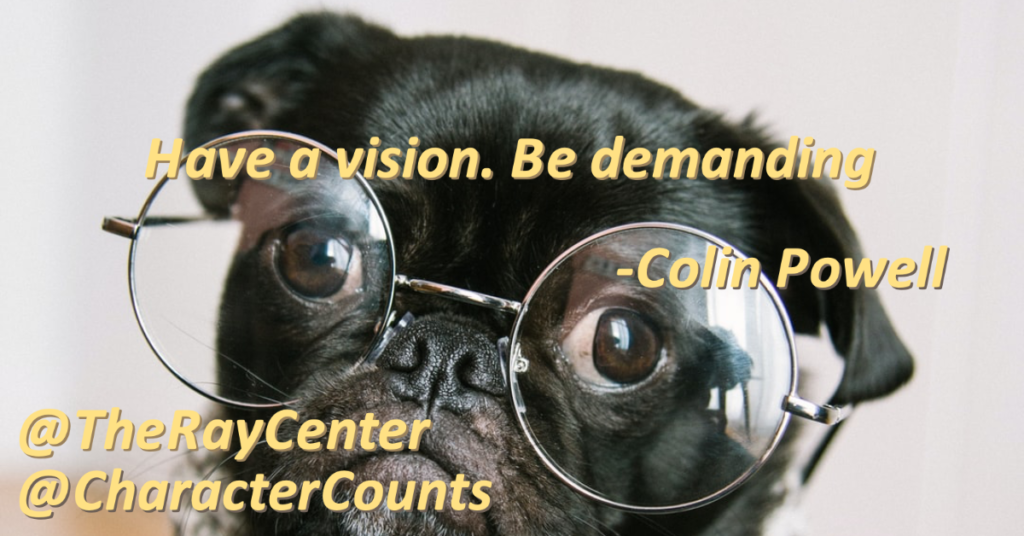The right path.
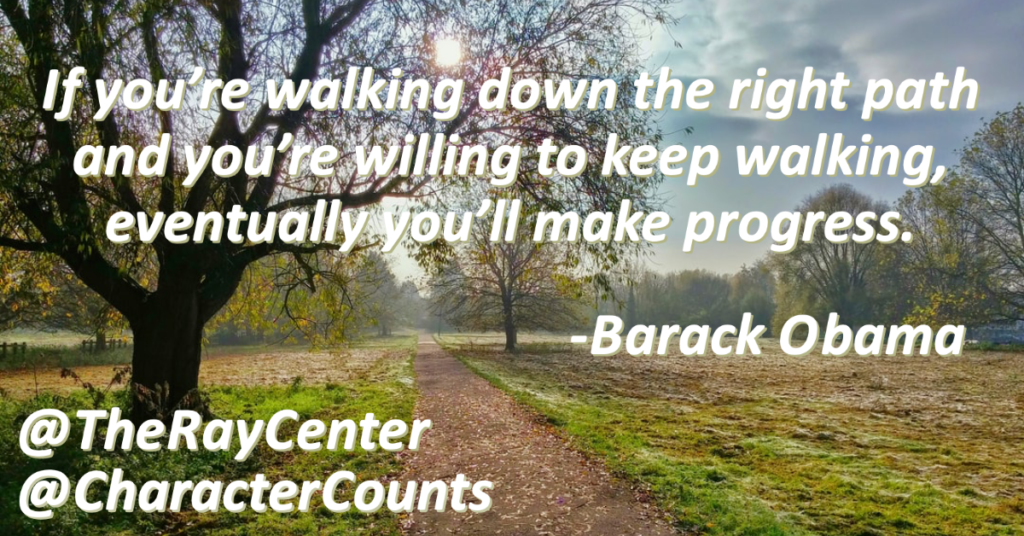
CHARACTER COUNTS! Coloring Book
Download our CHARACTER COUNTS! with Puppy Jake coloring book.
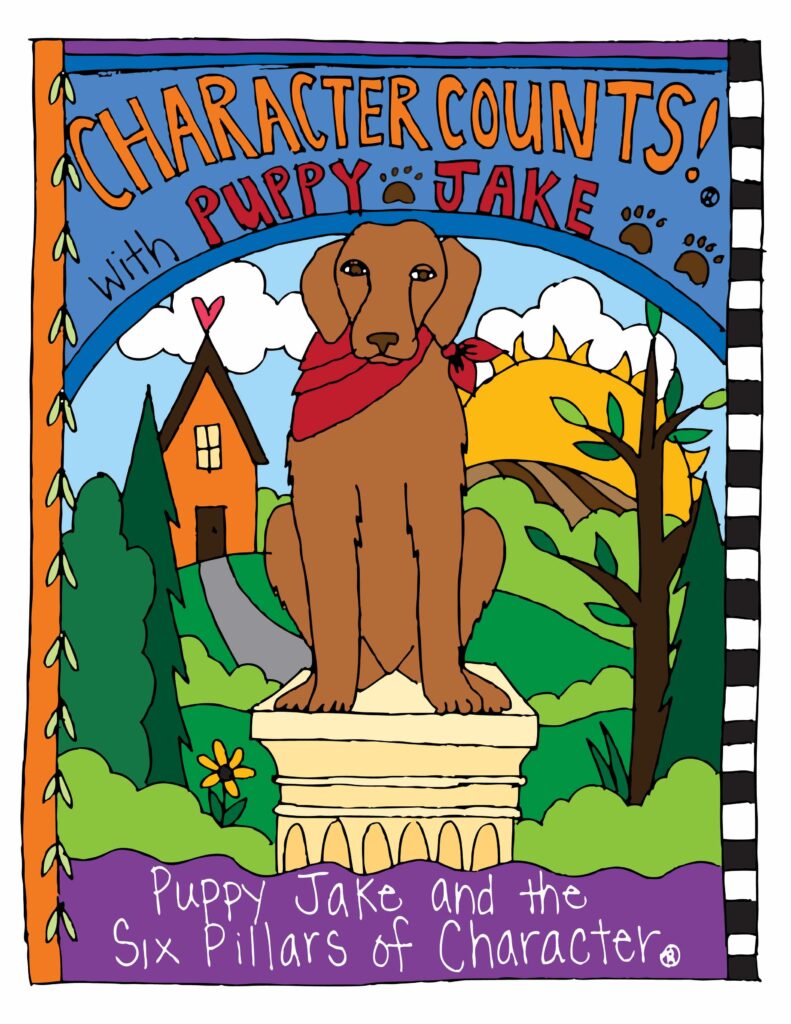
Special thanks to our friends at the Puppy Jake Foundation and Sticks.
Return to Learn: Fairness
In a time of uncertainty, it can be difficult to find fairness in diverse groups of stakeholders. Is it fair to prohibit young people from participating in social activities when it appears the effects of COVID-19 aren’t as severe for young and healthy people? On the other hand, is it fair to individuals in a demographic with more risk if young people increase their exposure to the virus and then spread it to others?
When clear solutions aren’t available, it’s up to individuals to negotiate win-win solutions that account for the needs and wants of all parties to reach a fair solution for the greater good. To do this, one must listen to understand what the other party wants by asking questions and restating what the other person says to ensure clarity. You must also clearly describe what it is you desire and why. Only when all parties understand that this is what you want and this is what I want, can you work together to find a “we could” win-win solution.
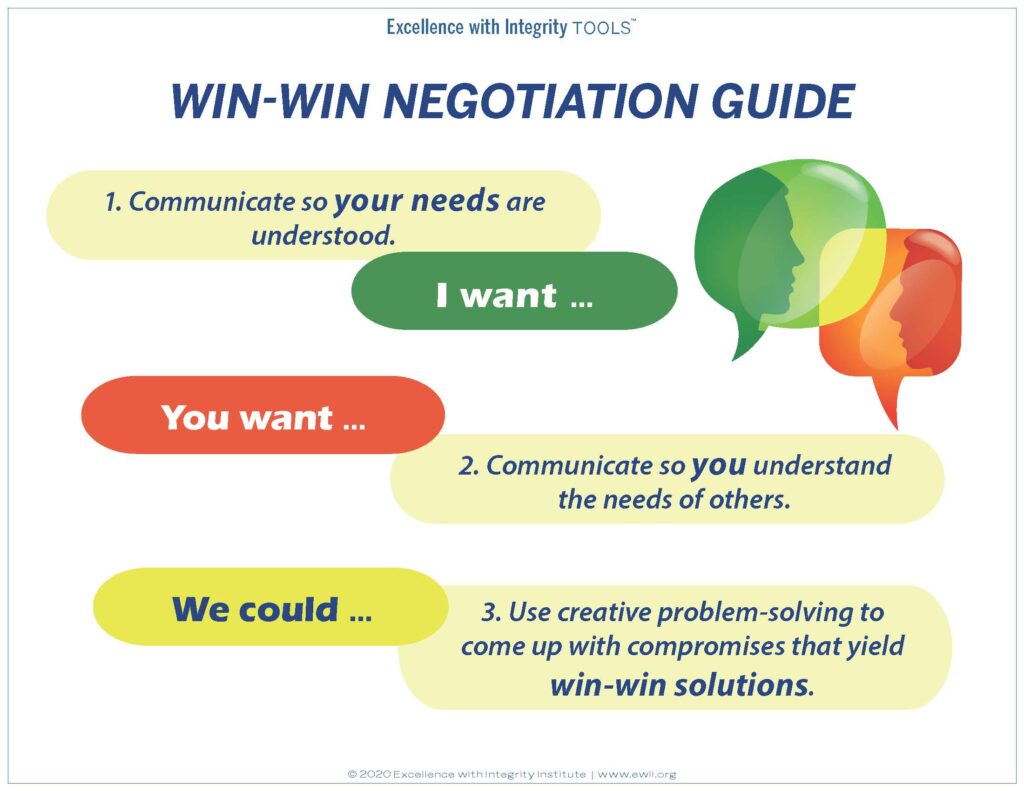
Fairness for Educators: Few things will be normal this school year. Educators will have to negotiate win-win solutions on everything from how students will pass each other in the hallways to how students will eat lunch. In every negotiation, commit to understanding the other person’s perspective, clearly state your idea, and stay focused on your common ground – what you both want to achieve.
Fairness for Students: Students can use the Win-Win Negotiation tool to help them find a compromise with teachers or parents. For example, students using win-win negotiation when asking permission to attend a social event would clearly articulate what they want (to attend the event) and why they want it (to see their friends), and would listen to and understand what their parent wants (child to be safe and healthy). Then, both parties can focus on solutions that can meet this objective (you can attend the event if there are less than 10 people and you wear a mask).
Fairness for Families: Families can use the Win-Win Negotiation tool to help find a compromise over work time if students are working from home. Or, the tool could be used to reach an agreement on what social activities students can engage in. Families can even use it when finding solutions with schools on everything from behavior issues to virtual versus in-person attendance.
Making Good Decisions in Tough Times
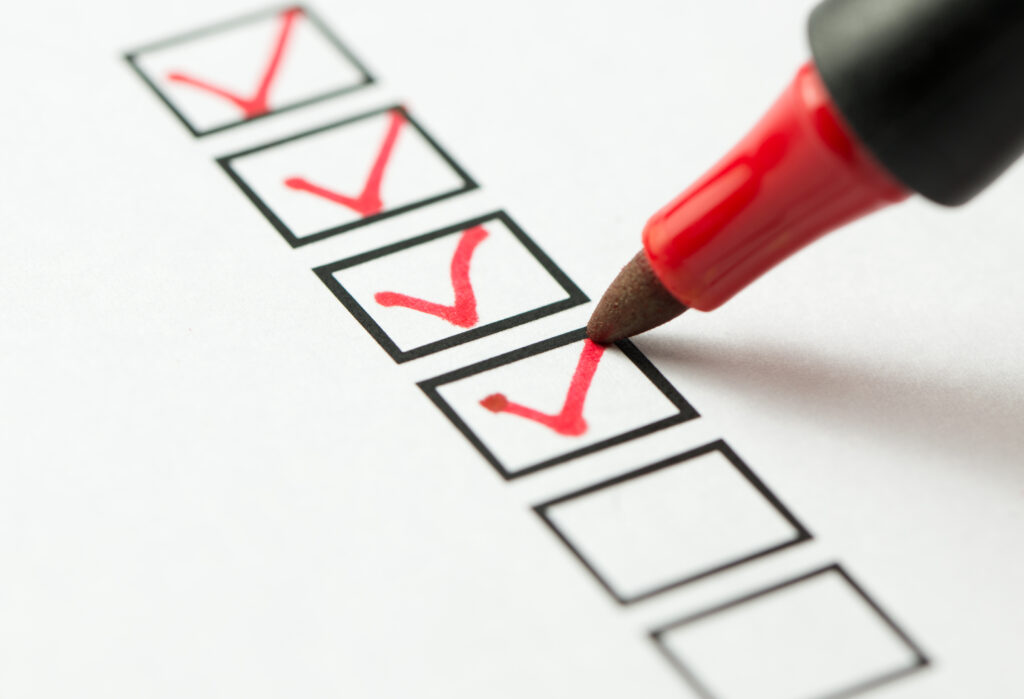
We all make countless decisions every day. Should you wear a face mask while out in public? Attend a social justice protest? Confront someone you disagree with?
Some of these decisions have relatively minor consequences (good or bad), while other decisions could have significant implications for us and others. A tool like the Character-in-Action Checklist (below) can help you navigate complicated choices and make the right decision.
When making a decision, ask yourself:
- Will my words and actions be honest, sincere, and reliable?
- If the situation was reversed, is this how I would hope to be treated?
- What are the consequences of my words and actions if I make this choice?
- Is my decision fair to everyone involved in and affected by my actions?
- Is my decision expressing compassion and kindness?
- Would I want to live in a world where everyone makes this choice?
Not every decision will align with each of the Six Pillars of Character. They can come into conflict with each other and even themselves. For example, sometimes the right decision isn’t fair to everyone involved. However, by identifying that a decision may not be fair, you can address the issue, explain why you made the decision, and provide support to those who perceive the decision as unfair. Or, sometimes the right choice may be contrary to a previous commitment, thus not in alignment with the trustworthiness test. Knowing this can help you determine how to honor your word when your decision doesn’t allow you to keep your word.
We’re facing troubling times and we can all contribute to the greater good by making sound decisions that reflect our best selves.
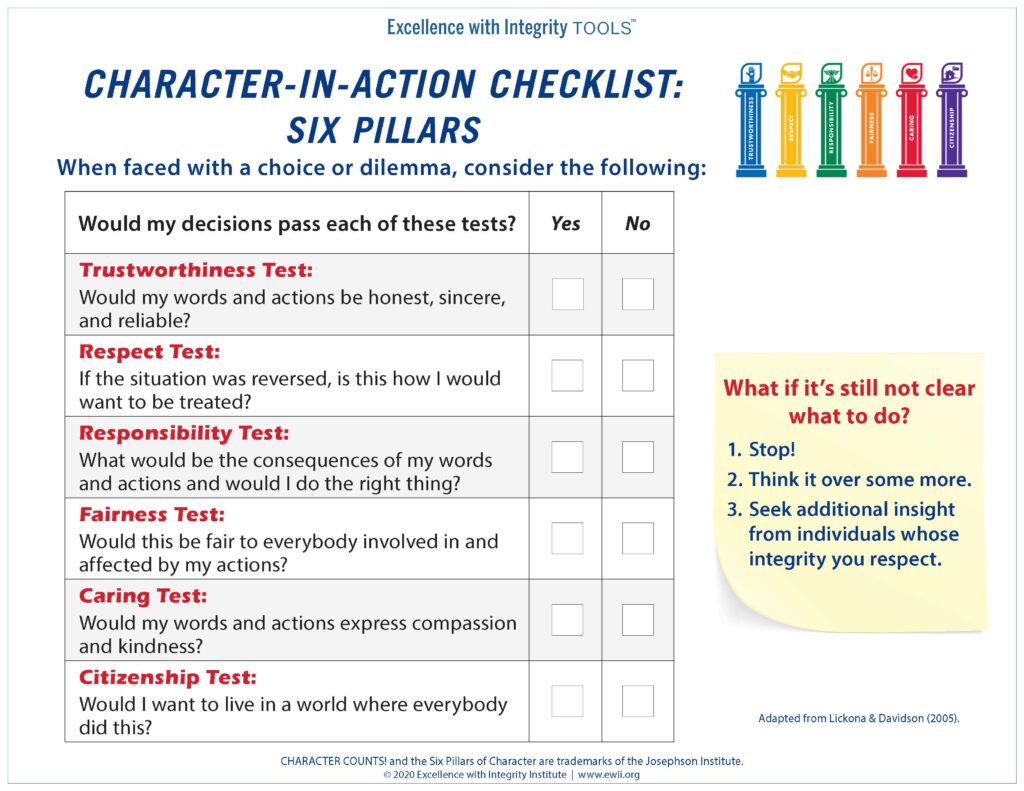
Character During Crisis

We are living through challenging and turbulent times. Americans are facing an international health pandemic, financial uncertainty, racial tensions, and civil unrest. It can be easy to feel helpless – wondering what possible impact someone like me can have on such great problems?
We can start with what is within our control: our character. Start by reflecting on the Six Pillars of Character (trustworthiness, respect, responsibility, fairness, caring and citizenship). Think of the Six Pillars of Character as ‘I’ and ‘action.’ We can ask ourselves: what am I doing to act in a capacity worthy of trust, how am I demonstrating respect, am I being responsible for my actions and consequences of my choices, are my decisions fair and equitable to those that are impacted, am I demonstrating a caring heart, am I being a good citizen fulling my duties and responsibilities?
Values like the Six Pillars guide us through difficult times and the actions we take. It is in these moments that we would do well to remember the words of Edward Everett Hale.
“I am only one, but I am one. I cannot do everything, but I can do something. And because I cannot do everything, I will not refuse to do the something that I can do.”
This is our challenge. What is the thing you can do? And not just today, but tomorrow, and next week, a year from now, and for the rest of your life because we know that there is always a way for us to get better, individually and collectively.
The issues that confront us are immense and it can be tempting to cave to feelings of inadequacy. But the fact remains, while you cannot do everything, you can do something. And remember, character counts in everything you do.
Way To Go Lesson Plans
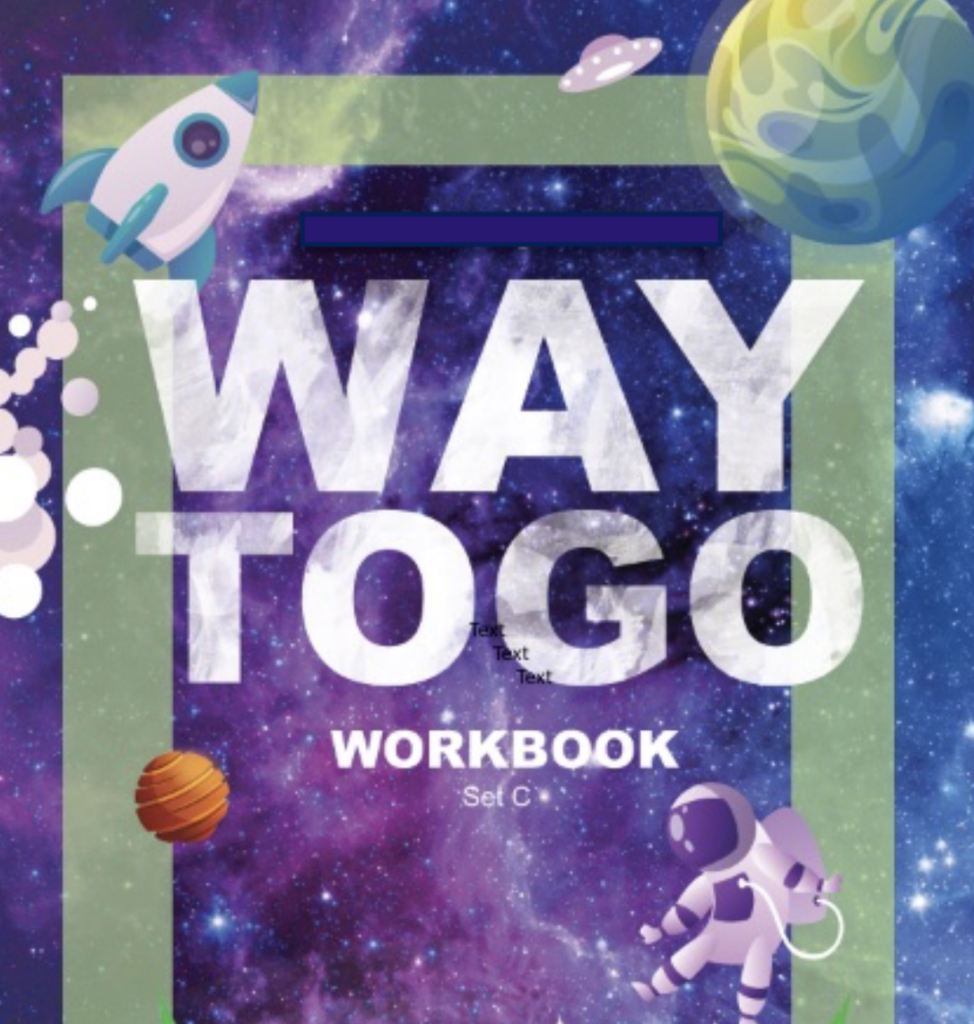
CC! can help schools with a resource to provide online lessons for use during this time that schools are closed.
Teachers can share with students a 10-12 minute lesson incorporating compelling images, quotations and thought-provoking short writing and discussion activities that focus on each of the three core domains of student development: academic, social/emotional and character.
We are providing a number of these lessons free to any teacher that would like to incorporate character into their online learning experiences.
Elementary School Way To Go Lessons
The Six Pillars of Character and the Holidays

As we gather around those who are most important to us this holiday season, we should keep in mind the Six Pillars of Character. Each Pillar can offer a new way to spread holiday cheer and joy to friends, family, coworkers, neighbors and even strangers.
Trustworthiness It can take a lot for us to put our trust in someone and for someone to trust us, and the holiday season is a great time to work on building trust. The most simple and straightforward way to build trust is to keep your word. If you say you’ll do something, do it. If you make a promise, keep it. During the holidays, we often count on one another to get the gifts, make the food, send the cards out or put up the decorations. By keeping track of and completing your holiday responsibilities you become dependable and build trust. Trust can even be built by inviting new people to your holiday gatherings, cooking a dish for a family in need or shoveling snow for a neighbor.
Respect Sometimes respect can get lost in the shuffle of the hectic holidays. When we are in crowded stores it can be easy to get frustrated with store employees or other shoppers. We need to remember that we are all doing our best, but sometimes stress can get the best of us. In these times, we should remember to always treat others how we would want to be treated. Being kind and forgiving to overworked retail employees, letting a busy family go ahead of us in line or using reusable shopping bags shows that we have respect for those around us and the environment. The holidays are all about being grateful, so show those around you that you respect them by following the golden rule.
Responsibility If you’re the one hosting a holiday gathering, you have a lot of responsibility on your shoulders. Always keep your word and do what you said you were going to do, but don’t be afraid to ask for help. If you need friends or family to bring a dish, help you clean up or watch your kids or pets, reach out to them. This can help you meet your responsibilities, but also help show you how responsible others in your life are.
Fairness It’s always the thought that counts. The holidays are not about comparing gifts that you have given or received. The holidays should be focused on celebrating the relationships of those closest to us. It can be easy to get caught up in the material things and the gift-giving, but making sure that we treat those around us with fairness should be at the forefront of our minds.
Caring There are countless ways that we can show that we care this holiday season. We usually show that we care by giving gifts to our loved ones, but we can show that we care in other ways as well. By donating our unused clothing, donating blood, cooking for a family in need or simply sending holiday cards we can show that we are thinking about all members of our community. For those that don’t have close families or don’t have the means to buy gifts, the holidays can be a difficult time. So, let’s show them that we care and want them to have a merry holiday season.
Citizenship The holidays are a great time to show that we are dedicated citizens. One of the best and easiest ways we can do this is by supporting local businesses and local restaurants. We can show our support of our communities if we do our holiday shopping at local stores that are run by our neighbors. Going to events put on around the neighborhood is also important. Whether it’s a craft fair, a holiday light show or an ice skating event, we can connect with members of our community while supporting those who make our communities so special.
Defining Fairness (Grades 6-12)

Character Education Objective:
- Students will discuss the meaning of fairness.
Content Objective:
- Students will define fairness.
Language Objective:
- Students will share their ideas and definitions of fairness from assorted quotes.
Purpose:
Fairness can vary based on definition and situation. Thus, students need to discuss what it means to be fair, and what should be considered unfair in their world. This lesson will give students the opportunity to view fairness from multiple perspectives, so they can create a more expansive picture of what it looks like and sounds like in different settings and situations.
Lesson
Partner discussion (2 min)
- What is something you think is unfair?
- What is the definition of fair?
Productive Group Work (10 min)
- Place quotes around the room (images or list of them)
- Students will meet with a group to discuss each quote
- The students will develop a definition or attributes of fairness based on the meaning they attributed to the quote
Share out your teams definition of fairness (5 min)
Create a class consensus definition of fairness (5 min)
Independent (3 min)
- What was your favorite quote and why?
“Win or Lose, Do It Fairly.” – Knute Rockne
“The Way You See People Is the Way You Treat Them, And the Way You Treat Them Is What They Become.”– Johann Wolfgang Von Goethe
“Live So That When Your Children Think of Fairness and Integrity, They Think of You.” – H. Jackson Brown, Jr
“Fairness Is Not an Attitude. It’s A Professional Skill That Must Be Developed and Exercised.” – Brit Hume
“I Think Perfect Objectivity Is an Unrealistic Goal; Fairness, However, Is Not.”– Michael Pollan
“From the Equality Of Rights Springs Identity Of Our Highest Interests; You Cannot Subvert Your Neighbor’s Rights Without Striking A Dangerous Blow At Your Own.”– Carl Shurz
“You Cannot Be Fair to Others Without First Being Fair to Yourself.” – Vera Nazarian
“If You Want to See the True Measure of a Man, Watch How He Treats His Inferiors, Not His Equals.” – J. K. Rowling
“We Hold These Truths to Be Self-Evident: That All Men Are Created Equal.” – Declaration of Independence
Fairness in the Classroom (Grades K-5)

Character Education Objective:
- Students will discuss the impact of unfair practices in the classroom. They will problem solve to make the classroom more equitable.
Content Objective:
- Students will define fairness and work towards making their community a fairer place.
Language Objective:
- Students will journal about personal experiences around fairness.
Purpose:
Fair does not always mean equal and that can be a difficult concept for children. This lesson is designed to help students understand that fairness is everyone getting what they need and not simply everyone getting the same thing. It will also allow your students to identify, discuss and problem solve ways the classroom can be fairer for all students.
Lesson:
- Ask the students “what does fair mean?”Watch “Build Character Build Success: FAIRNESS” video https://www.youtube.com/watch?v=AqPeMprcEDw
- Discussion Questions
- Would it be fair for the four students in the video to all take the same test with the items they first had?
- Why is it fair that the last student was given two items?
- What does fair actually mean?
- How can you determine if something is fair or not?
- What might be unfair in our classroom?
- How could we make our classroom fairer?
- How would making our classroom fairer impact all of us?
- JournalWrite/draw about a time when things were unfair for you. What would have made it fair for you? Would that have been fair to everyone else involved?
Family Connection:
Encourage families to create a compact of how they will treat one another fairly at home. In order to create the compact, discuss the following:
- What does fairness mean in our house?
- What does fairness look like?
- How will we act if things are unfair?
- How will we resolve unfair situations?
Once you decide how your family will treat each other fairly at home, write down the plan. Ask everyone in the family to sign the compact of fairness.
